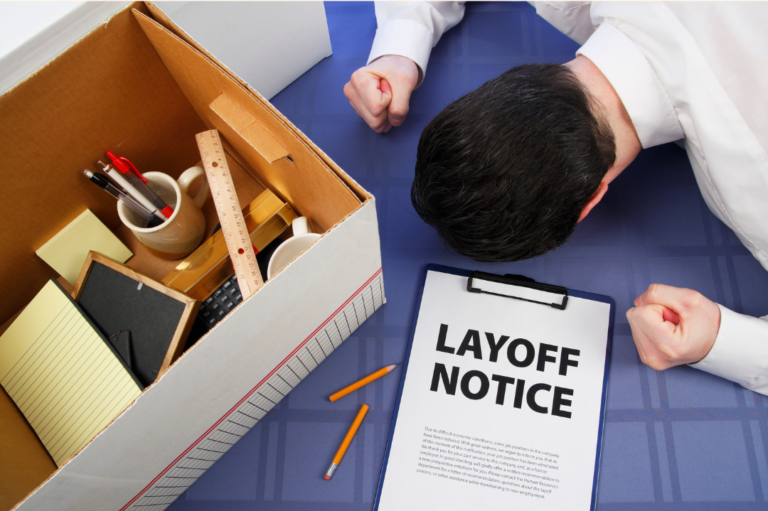
Layoffs are a professional trauma, it effects us psychologically, emotionally, mentally, financially, and the stress can affect us physically too. That’s just the surface issues people get to see, but the lingering effects can shake us to the core and impact how we see ourselves and define ourselves.
In today’s world, our work often defines us, an unexpected layoff can trigger a profound identity crisis, leaving you questioning your purpose, your value, and your place in the world. It’s often overlooked in the immediate scramble for new employment, but its impact can be deeply personal and long-lasting.
If you’re reading this, perhaps you’ve recently experienced a layoff, or you’re living with the gnawing fear of one.
You’re not alone.
This isn’t a reflection of your worth, but a challenging life event – a professional trauma.
Let’s delve into the ways job loss impacts your sense of self, explore the ripple effects on your self-efficacy, and, most importantly, provide actionable strategies to reclaim your narrative and rebuild your professional identity.
Deep identity crisis after being laid off
Layoffs have a deep cut into the core of who we are – For many of us, our jobs are far more than just a means to an end.
They are a cornerstone of our identity, providing a sense of purpose, daily structure, and a vital social outlet.
Think about it:
When you meet someone new, one of the first questions often asked is, “What do you do?” Our profession becomes a primary identity, a shorthand for who we are and what we contribute to the world. It gives us pride to share “I’m a X and I do Y…”
A 2021 Harvard Business Review article revealed that a staggering 56% of professionals who experienced unexpected layoffs reported a profound sense of identity loss, with 45% struggling with diminished self-esteem and confidence. It’s not just the loss of income; it’s the loss of a title, a routine, a professional identity, and a sense of security and purpose. (HBR)
The psychological impact can begin even before the official announcement. The anticipation of layoffs can trigger a state akin to “pre-traumatic stress,” characterized by hyper-vigilance, rumination over perceived inadequacies, and an avoidance of long-term planning. This chronic stress can impair decision-making, strain relationships, and negatively affect physical health.

Layoffs' impact on self-efficacy
The identity crisis triggered by a layoff doesn’t exist in a vacuum; it profoundly impacts your self-efficacy – your belief in your own capacity to execute behaviors necessary to achieve goals.
When your professional identity is shattered, your confidence in your abilities plummet – courtesy of Imposter Syndrome. This creates cascading negative feedback loop of negative self-talk, questioning our abilities, looking for mastery of skills so we NEVER get back to this situation, etc. All leading to destroying your belief in yourself – If you don’t believe you can succeed, why would you put in the effort?
This can lead to prolonged unemployment, which further erodes self-efficacy and abilities related to future planning and job searching competence.
Self-sabotage behaviors are prevalent – where we make small, careless, mistakes that continue to feed our negative self-beliefs without our conscious awareness. It’s a vicious cycle where unemployment directly impedes the very process needed for recovery—the job search—leading to deeper and more persistent mental health challenges.
You might find yourself disengaged from the world around you, family, friends, ex-colleagues, etc. are distant even with good intention you can become short away to ruminate on your self-worth and distance yourself from those that make you feel good. Fostering apathy and a profound loss of personal control – and hiding because of unprocessed shame and guilt for being a victim of layoff.
The practicalities of job searching also become more daunting. Resume employment gaps, a common consequence of layoffs, can reduce your chances of an interview. Leading to interview anxiety, second guessing, negative self-belief, sabotage, etc. all impacting your mental health while you’re on the job hunt.
The long-term effects on mental health are significant, including increased rates of depression, anxiety, and diminished self-worth. The persistent financial strain and uncertainty inherent in unemployment further exacerbate these symptoms. This complex interplay of identity loss, diminished self-efficacy, and the practical challenges of job searching can make the path to reemployment feel overwhelming.

Six steps to rebuilding your professional identity
This’ll be difficult if you choose to go at it alone – that is our primary mode – when things get bad for us we usually try to go alone. This is not advisable – people and community make healing and recovery easier and faster. Layoff is a trauma that can alter our professional identity and throw us into chaos and an existential crisis. While a layoff can hit hard, it’s important to remember that this is a temporary bump in the road, not a permanent label for who you are. Like many others, you will come out stronger, more resilient, as you rebuild your professional identity after the crisis, here are six steps to help you recover:
1. Acknowledge and grieve (it’s okay!)
The very first and most crucial step is to let yourself truly feel all the emotions that come with losing a job.
Don’t shy away, don’t burry it down, don’t focus on what’s next, just give yourself time to grieve. It’s perfectly okay to experience denial, anger, bargaining, sadness, and eventually, acceptance.
Don’t try to fight these feelings or rush through them. Give yourself permission to process what has happened. Giving yourself a well defined mourning period will help you grief and prioritize feeling all the feels – similar to losing a loved one – there will be intense emotional outbursts to help you manage the overwhelming psychological and emotional processing that we have to conduct to get back to “normal”, yet recognizing that with time that mourning will subside because we gave ourselves permission to process.
In creating the mourning period, focus on saying aloud, I will give myself one week, two weeks of mourning to maybe couple of hours of mourning before you resume your actions towards rebuilding. This is the tricky part – how much time should you actually give yourself?
When we don’t process our grief properly, it can take years and can cause us severe professional setbacks – so be generous with your mourning period – focus on the stages of grief: denial, anger, bargaining, sadness, and acceptance. Each deserves proper time – maybe a day for each, maybe longer. You might know, but your loved ones will know when they see the change in you.
2. Reframe and let go of self blame
This is hard, much more difficult than the first step.
Why?
We are battling our mind and we are battling our own thoughts without any external audience to hold us accountable and reality check our assumptions and self-talk. It’s super easy to fall into the trap of criticizing yourself and taking the blame for being a victim of the layoff, but it had nothing to do with you. It was a systemic decision to exclude X percentage of people and you just happened to be in that X percentage. Nothing personal, yet as a victim of layoff, I know it’s easier said than accepted. But, it is not your fault.
You had no control of the situation, even if you were the most loyal, highly skilled, irreplaceable person in the company – it can happen to you because it’s often someone without full awareness that is making the decision. Sadly, it’s an operational nightmare to account for everyone personally before laying people off, so they have a number they need to hit, they look at salary, tenure, and department to make the decision. Often computerized.
So, you need to learn to reframe that it wasn’t personal, it wasn’t because they didn’t know you, it was because an AI made the decision and you’re left with the consequences of it’s calculation. That’s mostly the case for mid-to-large companies. Smaller companies have a tough time making these decisions because its more personal and that can have more influence at a personal level.
Start reframing that this wasn’t about you – you are a strong candidate with attractive qualities – and it wasn’t your manager’s decision to let you go. It was likely multi-level higher, and you were the impact of the decision. As you keep reminding yourself of that, you can start accepting you are the victim of this traumatic experience and you have all the qualities you had prior to this decision and you’ll find another organization that’ll see your value.
Self-blaming will simply let our imposter self win the battles, which isn’t based on reality but mostly fear.
3. Make self-care a priority
During this stressful time, taking care of yourself isn’t a luxury; it’s absolutely essential. This is different from the past two steps, this is more about longevity of your journey – because the first step is to process and recover from the initial news of the layoff and it’s impact on your psychological, emotional, and professional identity – just to move from the chaos to stability. Second stage is about fighting off the negative self-talk that can erode our self-confidence and become a poison to our progress.
This step, self-care, is about rebuilding your base and creating a healthy ground beneath your feet so you feel grounded, confident, and can recognize when you’re back into grieving stage and when imposter syndrome are trying to return.
This is where I see more people struggle – because this is easy – and self-care is a “reward” for being good, better, successful, etc. That is what keeps most people from accomplishing greater success – when we prioritize our self-care we get to build unwavering self-confidence that says, “I’m good enough” “I’m successful” etc. these positive self-talk becomes the core in which we start to flourish.
Just focus on these few steps:
-
Keep a Routine: Having a structured day helps you stay motivated and avoids that aimless feeling. Set small, achievable goals each day. This gets us outside of our head and into something where we can show we can still perform.
-
Psychological well-being: Journaling is a great way to separate your thoughts from yourself, and it can help you create accountability rubric to see where you’re struggling, where you’re excelling, where you’re falling for a mindset trap, etc. The whole struggle is an uphill battle and having a career counselor can help you navigate the complexities of the identity crisis and get you feeling more like yourself faster and you’ll also have a objective partner to help you process through the full scope of emotional, mental, and job search journey. More on career counseling support later…
-
Physical Well-being: Make sure you’re getting enough sleep, eating nutritious meals, and exercising regularly. Even just 30 minutes of moderate exercise a day can help lower stress hormones and bring back balance. Try to avoid unhealthy coping mechanisms like too much alcohol or junk food, as they only offer temporary relief and can make things worse in the long run. When we practice healthy activities it internalizes that we value ourselves and we aren’t looking for a quick escape (alcohol, junk food, binge watching, etc.) that further drain our natural energy.
-
Mindfulness: Practice relaxation techniques like mindfulness or meditation to help manage stress and anxiety. It doesn’t have to be about sitting and breathing, mindfulness activities can include exercising, reading and writing on paper – digital devices are convenient but that have a cost, coloring, blowing bubbles, etc.

4. Connect and Lean on Your People
Imagine falling into a cave, and as people pass by you don’t yell for help. You’ve explored the cave extensively, and there doesn’t seem to be an way out. So, you practice the first three steps above, focus on grieving, reframe your negative self-talk, and practice your self-care. ALL crucial for you, but you don’t yell for help, you don’t even whisper that you need support and help.
This is what most people do when they have been laid off – they isolate – they don’t ask for help. They believe they can get out by themselves, but in reality, you can get yourself out but the cost is more severe than yelling for help, asking for guidance.
Someone on the other side of the cave might have the rope, ladder, etc. to help you climb up. But, if you don’t ask you will never know.
Let’s make this story even worse – the people who love and care about you – when they come to look for your and support you, in your anger (grief) you yell at them and keep them from helping you by saying hurtful things to them and about you (sadness/depression), keeping them away from you isn’t going to help you – it’s only going to hurt you (negative self-talk/self-blame).
Please don’t isolate yourself.
It’s a natural reaction to want to withdraw due to shame or embarrassment, but connecting with others is like nature’s way of fighting stress:
-
Lean on your network: Talk to trusted friends, family, and former colleagues. Share your feelings and let them know how they can support you.
-
Join support groups: No one understands what you’re going through better than people who’ve been there too. Job seeker support groups can offer great advice and help you feel less alone.
-
Professional connections: While personal support is important, don’t neglect your professional connections – they also care about you and want to see you succeed.
5. Develop your skills and re-evaluate your priorities
Ever get an opportunity to upkill or reskill middle of your career? Most people invest in their skill development after work or stop putting themselves in the learning environment because of competing priorities.
During a layoff, as you’re continuing your job search – rebuilding or up-skilling can help you stand out and provide a more unique skillset to your next organization. You can even re-evaluate your career path – was the previous career still aligned with your life and core values?
Taking this time to dive deeper into the possibilities that exist is a timely investment:
-
Upskill and reskill: The job market is always changing, so it’s a great idea to keep your skills sharp. Figure out what skills are in high demand in your industry and consider investing in online courses, certifications (like data fluency or AI literacy), or workshops. Invest in leadership development to take your skillset into the next realm, engage in entrepreneurship to launch your own business (Airbnb, Uber, etc. all started after the 2008 great recession where people were laid off).
-
Re-evaluate your path: Use this time to really think about your strengths, skills, and areas where you’d like to improve. It’s a perfect chance to get clear on your personal values and what you absolutely need in a job, which might even open doors to a completely new career path. Don’t let these moments pass you by because it’s tough to find time in our busy and growing world.
6. Be strategic about your job search
Most people will start applying to “I can do this job” and then go to “I’ll just apply because it’s open”, to “I don’t care, i need a job” these are not a healthy strategy – these are ways to get stuck in jobs that won’t make you happy or provide success. These are trauma responses of I need to fill my time again or else I’ll lose my mind – it’s okay to be here, but please return to step 1 and continue working on them.
Approaching your job search with a smart plan and clear intentions, and it keeps you motivated because you get to see your action in progress and the impact of your intentionality.
-
Apply, apply, apply and hope isn’t a strategy: Focus on building a plan for yourself, talk with a career counselor/coach to help you game the system so you’re more impactful when you apply. Here’s a few starting place – Time management focus on building your job search workday, treat it like your full-time job, and at 5pm, step away for non-job related activities, build your TOP 20 list of companies, organization you want to work for, Identify top 5 job titles that align with your passion, etc.
-
Spruce up your online presence: Give your resume a refresh and make your LinkedIn profile shine. Update your headline to show where you’re headed, not just where you’ve been. Use your “About” section to tell your story clearly and purposefully. Share interesting articles, comment on industry trends, and join conversations that show your leadership.
-
Apply smart: Focus on applying to fewer, more tailored roles. Research shows that targeted applications are three times more likely to land interviews than just sending out a bunch of generic ones. There’s a trick to this – focus on the TOP 5 – and why not apply AI to help you.
-
Network actively: Reach out to former colleagues, managers, and people in your industry. Go to industry events, join professional groups, and connect in online communities. Remember, “changing careers is about who you know,” and networking is “much more efficient” than just applying online.
-
Consider a career pivot: A layoff can actually be a great time to explore completely new career paths, like franchising or even buying an existing business, especially with AI changing so many traditional jobs.

Shameless plug - How can a career counselor help?
Navigating the emotional and practical maze of a layoff can feel incredibly overwhelming, and that’s exactly where a career counselor or coach can become your ally. They offer so much more than just job search tips; they provide a guiding hand right through the heart of that identity crisis.
-
Personalized guidance and accountability: A great career coach can help you really dig into your strengths, what you might need to work on, and your career dreams, giving you personalized advice and strategic guidance. They’re also fantastic as sounding boards during those emotional moments and provide that crucial accountability to keep you moving forward. A career counselor has the educational background of counseling to help you recover from the emotional turmoil of the layoff and identity crisis.
-
Sharpening your story and personal brand: They can help you craft your personal narrative, clearly explain your impact and contributions in past roles, and tailor your message for different jobs or industries. This is key for rebuilding your professional brand and sharing your value authentically.
-
Interview preparation and confidence building: Even seasoned pros can feel a bit rusty or anxious during interviews. Career counselors offer mock interviews, give constructive feedback, and help you present yourself with clarity and confidence, which can really reduce anxiety and boost your chances of success. Don’t let your actual interview be a practice interview, practice early and often and your first interview will become an offer.
-
Navigating the “hidden job market”: Many job opportunities are never publicly advertised. Connect with the right people and discover new opportunities through networking support – most people won’t tell you, but focusing on networking unlocks these access points.
-
Emotional support and resilience: The best career counselors understand that losing a job is a personal journey. They offer mental health support resources to help you process grief, stress, and fear, building your emotional resilience for the road ahead.
-
Strategic roadmapping: They can help you create a personalized, flexible job search roadmap, breaking down the overwhelming process into manageable steps and helping you take consistent, meaningful action.
In essence, a career counselor acts as your compass, helping you find your new North Star, navigate the emotional landscape, and equip you with the tools and confidence to not just find a new job, but to redefine your professional identity on your own terms.
You're not alone
Losing a job is, without a doubt, one of life’s toughest experiences, and it can definitely trigger a deep identity crisis that goes way beyond just financial worries. It can chip away at your self-worth, shake your confidence, and cast a shadow over your future outlook. But here’s the powerful truth: it can also be an incredible catalyst for looking inward, re-evaluating, and ultimately, reinventing yourself.
Following the steps above is a great way towards your recovering and rebuilding your professional identity. It will take time, like all worthwhile and meaning things in life, but you will be stronger and more resilient for it. Remember, your true worth isn’t tied to a job title or a company name.
Embracing professional guidance from a career counselor can give you that structured support, emotional resilience, and smart insights you need to navigate this transition with confidence. We can help you turn the challenge of a layoff into an amazing opportunity to redefine your purpose, align your career with what truly matters to you, and step into a future where you’re not just re-employed, but truly redefined.
Schedule a consultation to find out how I can help.

